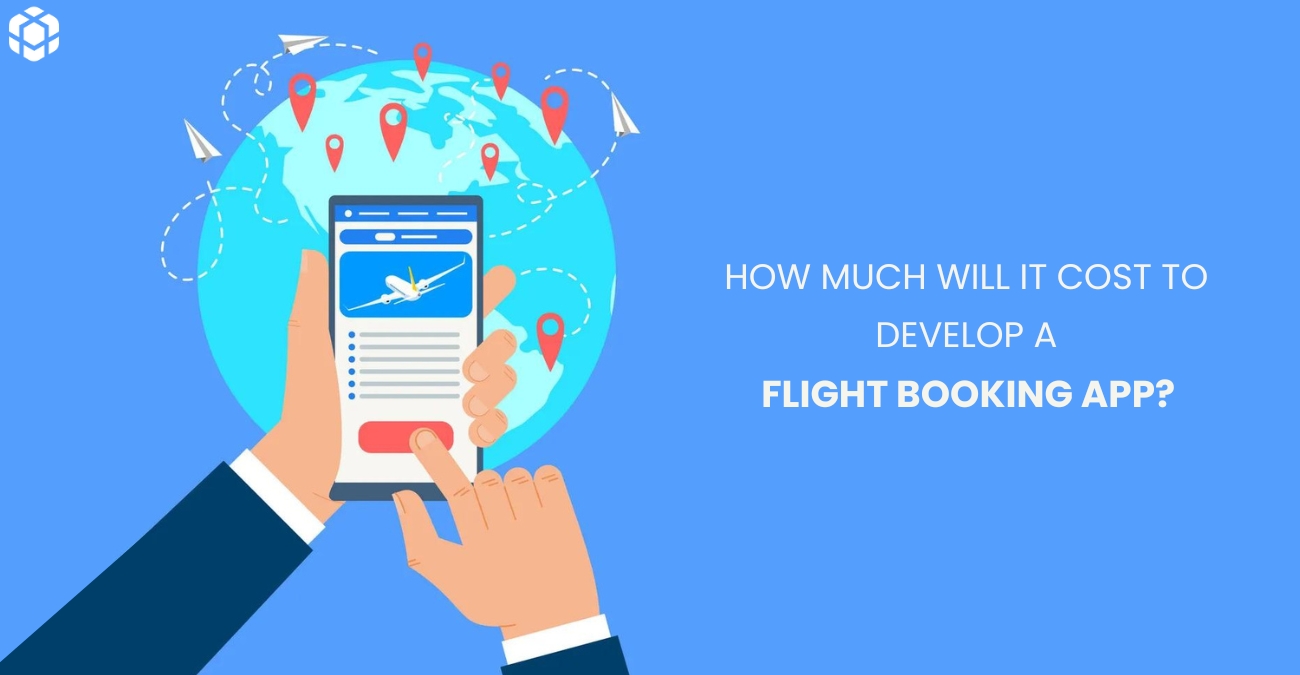
Gone are the days when you had to travel to booking offices to buy tickets or gather general information. In this digital age, everything can be done at your comfort through various applications to fulfill these purposes.
Flight booking apps are no different and have seen a recent surge in the market due to widespread public demand. More and more people now prefer to book and track their flights from the comfort of their homes. Because of the nature of these applications, companies who develop them or want to dabble in this market can potentially make significant profits.
This article aims to detail the intricacies of developing a flight booking app and sheds light on factors that affect the development cost.
Flight booking app development: Things you need to know
In the ever-evolving landscape of travel, the widespread use of smartphones has completely changed how we arrange our trips. Flight booking apps stand at the forefront, reshaping the way we engage with travel services. Beyond mere flight reservations, these apps offer an array of functionalities—real-time flight tracking, price analysis, and seamless payment gateways—rendering travel planning more efficient than ever.
Embarking on the development of a flight booking app necessitates a strategic estimation of both cost and time. Understanding the intricacies of this process is pivotal in crafting a user-centric, reliable, and feature-rich platform. The cost considerations encompass various facets, from app design and development to the integration of APIs for comprehensive service offerings like car rentals, hotel reservations, and airport transfers.
A flight booking app can be developed for anywhere between $40,000 and $200,000, depending on a variety of factors. However, the app’s complexity is the biggest factor affecting development costs. Read this article through to the end to get more information about these aspects, and then create the best booking apps.
Elements and functionalities of a flight booking app
A robust flight booking application is designed to cater to diverse user needs by offering comprehensive features and functionalities. By seamlessly integrating various elements, it aims to provide an intuitive, hassle-free experience for users seeking to book flights. From streamlined search options to secure payment gateways, the app should incorporate a range of essential components to facilitate efficient flight bookings, including:
Flight listings and comparisons
The app must showcase a comprehensive list of available flights that meet the user’s search criteria. It should include essential information such as airline names, departure and arrival times, flight duration, layovers, aircraft type, and onboard amenities. The users must be able to compare these details to make informed booking decisions.
User-friendly interface
An intuitive and user-friendly interface is pivotal for flight booking apps, ensuring effortless navigation and accessibility to desired functionalities. A complex or convoluted user interface can dissuade users from utilizing the app for their booking needs. Therefore, a streamlined and intuitive interface remains instrumental in enhancing user engagement and fostering a positive user experience, encouraging users to return to the app for future bookings.
Booking and payment
Once the user finds the flight they want, they should be able to book it right there on the app. The app should allow many payment options, including credit cards, debit cards, and e-wallets, and have an easy-to-use booking interface. Users on the app should have access to their itinerary and booking information.
Integration with loyalty programs
Loyalty program integration within booking websites or apps is an indispensable feature that significantly enhances user engagement and conversion rates. Many airlines offer extensive loyalty programs, granting frequent flyers exclusive perks such as lounge access, complimentary flights, and upgrades.
A well-designed flight booking app should seamlessly incorporate these loyalty program functionalities. Users should easily access information on accruing and redeeming points, manage their loyalty program accounts, and explore available benefits directly through the app.
Revenue models of flight booking apps
Flight booking apps employ various revenue models to enhance profitability and meet business goals. Some of these models include:
Subscription model
One of the most popular revenue models employed by flight booking apps is the subscription model. Users are offered a range of subscription plans, each with its own set of benefits and features. By subscribing to these plans, users can access exclusive deals, discounts, priority bookings, and other perks.
The subscription fees are usually charged on a monthly or yearly basis, ensuring a steady income stream for the app developers. Additionally, the subscription model fosters a sense of loyalty among users, as they are more likely to make use of the app consistently to reap the benefits of their subscription.
Advertising model
Another revenue model that flight booking apps employ is the advertising model. These apps provide a platform for advertisers to showcase their products and services to a highly targeted audience – travelers. Advertisements can take various forms, such as banner ads, sponsored listings, or targeted promotional offers.
App developers generate revenue by charging advertisers based on the number of impressions, clicks, or conversions their advertisements generate. This mutually beneficial arrangement allows advertisers to reach their target audience effectively while providing flight booking apps with a significant source of revenue.
Markup model
Under this model, the app adds a markup to the original price of the flight tickets. The markup serves as the app’s commission for facilitating the booking process and providing the user with added convenience. This approach allows the app to generate revenue directly from the users, ensuring a steady income stream irrespective of the number of bookings made. Moreover, flight booking apps often partner with airlines to secure discounted rates, enabling them to offer competitive prices even with the added markup.
Commission-based model
Flight booking apps also leverage the commission-based model to generate revenue. By partnering with airlines, hotels, car rental agencies, and other travel service providers, these apps earn a commission on each booking made through their platform. This commission is typically a percentage of the total transaction value.
The commission-based model benefits both the app and the service providers, as the app gains revenue for facilitating the booking, while the service providers gain exposure and access to a wider customer base.
Affiliate marketing model
Through affiliate marketing, apps promote the products and services of other travel-related businesses, such as travel insurance providers or luggage vendors. When a user makes a purchase through these affiliate links, the app earns a commission. This model allows flight booking apps to diversify their revenue streams while providing valuable recommendations and additional conveniences to their users.
Features to include in a flight booking app
As far as the features of a flight booking app are concerned, we have already mentioned the basic functionalities that form the basis of any booking application. That’s not all, though, since there are a ton of advanced features that, when included in the flight booking application, improve the user interface and overall experience.
A list of the advanced features of a flight booking app is as follows:
- Virtual travel agents: Incorporates AI-driven assistance, offering personalized recommendations and guidance throughout the booking process, mimicking the support of a human travel agent.
- Virtual reality tours: Allows users to get an immersive preview of the cabin, seats, and aircraft amenities before making flight selections.
- Live flight tracking: Allows users to monitor real-time flight statuses, including delays and estimated times.
- Secured payment methods: Integrates robust encryption and secure payment methods, ensuring users’ financial data safety during transactions.
- Price comparison: Enables users to evaluate costs for several airlines and dates, assisting in making the most economical choices.
- Seat selection: Allows users to choose preferred seats based on availability and view seat maps for various flight segments, enhancing the booking customization process.
- Itinerary management: Provides users with a centralized platform to manage their travel plans, view bookings, and make alterations or cancellations when needed.
- Packages and discounts: Offers discounts, bundles, or package packages that combine airfare, lodging, and other travel-related services to maximize convenience and savings.
Factors Affecting the Cost of Flight Booking App Development
Developing a flight booking app involves various factors that significantly impact its overall cost. By analyzing these factors, individuals and organizations can gain a better understanding of the financial implications involved in creating and maintaining such applications.
Technology stack
The cost of the finished product is largely determined by the technology, which includes the programming languages used to develop the booking app. Some languages that are mainstream and relatively easy to implement tend to keep the development cost within budget. On the other hand, the cost of developing your app will go up dramatically if you want to include technologies like AI and Ml.
Development team
The type of development team you choose to work on your flight booking app also forms a determining factor of the development cost. When considering things more broadly, hiring an internal team will usually end up costing you more than hiring an outside team to develop your app. Because outsourcing can save costs, it’s becoming the preferred option for most businesses. For this reason, it’s advised that you outsource the development of flight bookings.
Features of the app
Basic features that form a part of any booking application, such as the payment gateway or login and signup feature, don’t directly affect the development cost. However, a comprehensive flight booking platform involves integrating flight APIs, user management, secure payment gateways, notifications, analytics, and ancillary service connections. The more features and integrations needed, the greater the development cost due to the complexity and scope of the system.
Platform
Whether it is an iOS or Android platform, each has its own set of requirements, development tools, and programming languages. Taking these platform-specific considerations into account, developers must tailor the app’s functionality and design accordingly. The complexity and expertise required for platform-specific development can have a substantial impact on the overall cost of the project.
Localization
Localization involves adapting the app’s content, features, and design to cater to different languages, cultures, and regions. This process includes translating the app’s text, modifying user interface elements, and considering regional preferences and regulations.
The more extensive the localization effort, the higher the expenses involved in terms of both time and resources. Therefore, organizations looking to develop a flight booking app should carefully consider the extent of localization required and allocate appropriate resources accordingly.
Maintenance and support
Maintenance and support after the initial app launch include regular software updates, bug fixes, server maintenance, and customer support. Often, app development companies offer maintenance and support packages, which can either be included in the initial development cost or billed separately. Allocating a budget for ongoing maintenance and support is essential for a successful and sustainable flight booking app.
Conclusion
In summary, the cost of developing a flight booking app is influenced by various factors, such as the app features, the extent of localization required, and the investments made in maintenance and support. The number of features and whether they are advanced or basic also determine the overall cost of the flight booking app.
Understanding these factors and their corresponding financial implications is vital for individuals and organizations looking to invest in developing a flight booking app. By carefully considering these elements, stakeholders can make informed decisions and ensure the successful implementation and operation of their flight booking app.





